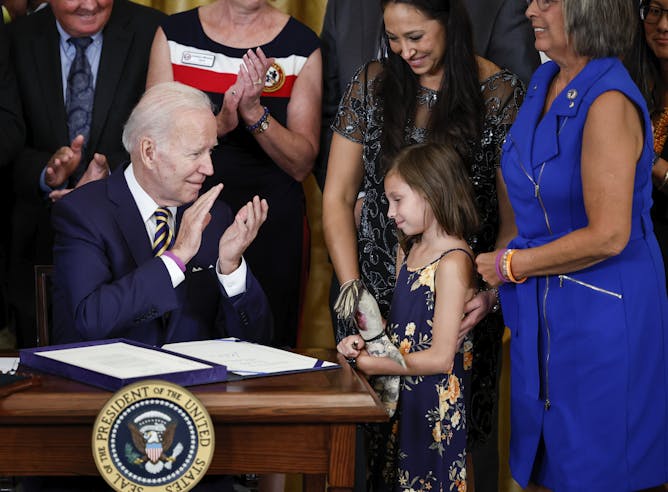|
You probably know that Wyoming Rep. Liz Cheney, the GOP’s strongest – and loneliest – Donald Trump critic, lost her reelection bid this week. You probably know it’s because Trump waded into the race, bent on revenge, and endorsed a rival GOP candidate. You may even know that Cheney quoted both Presidents Abraham Lincoln and Ulysses S. Grant in her concession speech.
But what you may not know is how the once-popular Wyoming legislator could be unseated by what political philosopher Robert Talisse describes as a “one-term, twice-impeached and historically unpopular former president” who was able to “catapult an unknown candidate into a massive win over an effective incumbent.”
Talisse, who teaches at Vanderbilt University, offers an elegant lesson in how the public interest can be subverted by partisan identity – an increasing problem in America’s democratic system.
“We assume that voters first determine their interests and then support candidates who will best advance them,” he writes. But this assumption puts things backward: “In today’s hyperpartisan America, political interests are the product of political allegiances – not the other way around.”
|

Rep. Liz Cheney at a primary Election Day gathering at Mead Ranch in Jackson, Wyo.
AP Photo/Jae C. Hong
Robert B. Talisse, Vanderbilt University
Liz Cheney has been a conservative GOP congressional policymaker since 2016. But when she turned against Donald Trump, GOP voters in Wyoming turned against her.
|

President Joe Biden applauds Brielle Robinson, daughter of the late Sgt. First Class Heath Robinson, after signing the PACT Act on Aug. 10, 2022.
Chip Somodevilla/Getty Images
Jason A. Higgins, Virginia Tech
President Joe Biden signed into law the most expansive health care package for military veterans in recent history – despite initial GOP opposition.
|

Don’t expect the Inflation Reduction Act to bring down prices all that much.
AP Photo/David Zalubowski
Nirupama Rao, University of Michigan
The new law will pay for increased spending in several ways, including a corporate minimum tax and funding tax code enforcement by the IRS.
|
|
|
-
Karrin Vasby Anderson, Colorado State University
Threats to law enforcement have risen in the aftermath of the FBI raid on former President Trump’s Florida estate. Does ‘message laundering’ by top GOP figures have something to do with it?
-
Ronald Suny, University of Michigan
Democratic nation-states were supposed to be the legitimate successors of empires. It hasn’t quite worked out that way in the past century, and Russia’s war on Ukraine is a reflection of that.
-
Joseph Ferguson, Loyola University Chicago; Thomas A. Durkin, Loyola University Chicago
Two national security law experts explain how the Espionage Act isn’t only about international intrigue, and share other important points about the law that was invoked in a search of Trump’s estate.
-
Patrice McMahon, University of Nebraska-Lincoln
A scholar of humanitarianism sums up what she saw on the ground during a five-week research trip to Poznań, Lublin, Warsaw, Krakow and several smaller cities along the Poland-Ukraine border.
-
Jeffrey Fields, USC Dornsife College of Letters, Arts and Sciences
What are classified documents? Who gets to see them? What happens if they are released?
-
Andrew Mines, George Washington University; Amira Jadoon, Clemson University
The Taliban promised not to allow Afghanistan to be used by groups seeking to attack the US, yet terrorist groups have only become more emboldened under its rule.
-
Matthew Miller, Northeastern University; Deborah Azrael, Harvard T.H. Chan School of Public Health
Youth suicides in the US have increased by around 50% over the past decade – gun availability is a big part of that trend.
|
|